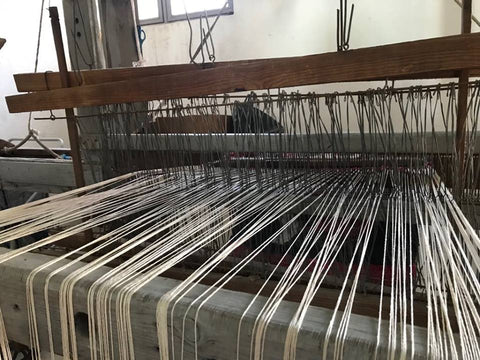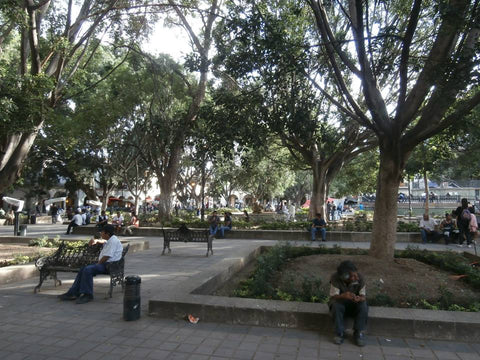We are just coming back from Guadalupe Silva's artisan store, Cuauhtémoc, also called "El weaver", here in La Paz, Baja California Sur, Mexico. It's the oldest crafts store in La Paz. It is named after the last Aztec emperor of the Mexica people.
When you enter this store, you step back in time in an instant. Nothing has changed for a long time. You are revisiting the 1960s.
Guadalupe's dad, Fortunato, created this business about 60 years ago. His whole family was helping as weavers, seamstresses, etc. It was a bustling place in La Paz where locals would buy all their sheets, towels, bedspreads etc. Here's a few pictures dating back to the booming days of this store in the 1960s:



In this last picture, Fortunato is seen at the spinning wheel.
Fortunato used to travel to other parts of Mexico in order to get raw materials for his business. He knew exactly where to go and who to see. He was a keen business man. His business was at its best. Back home, his family was taking care of the spinning and weaving.
What happened then?
In 2002, La Paz stopped growing their own cotton in the valley. The water had become too expensive to keep on growing this crop. This was a first blow on Fortunato's business. In 2009, a flu epidemic swept accross Mexico. Tourists stayed away. The price of cotton and wool also went up. This was the last blow. Weaving stopped altogether at Fortunato's place. The looms went quiet. Here is what they look like today:

Guadalupe gave us a tour in the back of the store, where all the spinning and weaving used to take place. The 4 old tread looms are still standing there:



This is a traditional tread/foot loom. They were originally introduced in Mexico by the Spanish.

It would not take that much to restart these looms. José, Fortunato's grandson, is ready to hit the loom again. He's not the only one left with the knowledge of traditional weaving in the family. Click here to see a bedspread that is made on this kind of loom in Oaxaca.
In Fortunato's store, they used to get the cotton as picked from the cotton plant and spin it themselves with these 3 machines:




Guadalupe, Fortunato's daughter, is in charge of the store nowadays. Since they do not sell their own products any more, they sell crafts from other parts of Mexico and from Guatemala, and some of Pazeña's items. Their customers are mostly American and Canadian tourists in the winter time. Some of them have known the store when the looms were still running and feel nostalgic of the rythmic beat in the back. The place does feel a little empty, as if it was missing its soul.
But, not all is lost and weaving may resume next year with the support of a sponsor. Let's wish them all the best. Fortunato's work will not be in vain.
The following are pictures of a cotton tree in our street in La Paz and of a cotton flower.























